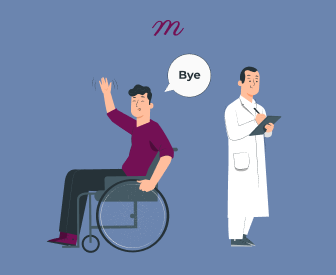Have you ever thought about the importance of saying goodbye at the end of therapy? Imagine that critical moment when you're ending a session with a client who has become essential to your professional life. Rather than simply feeling bittersweet, what if you saw goodbye as a crucial transition for both of you? In this article, we'll examine the emotional and practical aspects of therapy termination, providing insights, tools, and reflections to make this ending a meaningful and empowering experience. Let's explore how to transform the final goodbye into a profound moment of growth and closure.
The Importance of Therapy Termination
Ending therapy is a formality and a crucial part of the healing process. This final phase allows clients to reflect on their progress, solidify their achievements, and prepare for life beyond therapy. A well-planned termination can significantly impact a client's future success by helping them feel confident and prepared for upcoming challenges.
Closing the Circle: Ensuring Lasting Impact
Think of therapy termination as the final bow that ties everything together. It marks a moment of accomplishment where your guidance has enabled clients to reach a point where they can continue their journey independently. This phase reinforces their progress and helps reduce the likelihood of setbacks, providing them a sense of closure and readiness for what lies ahead. As a therapist, this signifies your skills and dedication, representing a moment of professional fulfillment that validates your hard work and commitment.
Setting the Stage for Future Success
It's essential to have a thoughtful termination process to help clients sustain long-term success by:
Recognizing Their Progress and Strengths: Celebrate their achievements during therapy.
Developing Strategies for Maintaining Gains: Create specific plans to support ongoing progress.
Building Confidence in Their Ability to Handle Future Challenges: Empower them to face difficulties with resilience.
Investing time and effort into this final phase ensures that your clients have the tools to thrive long after they leave your office, reinforcing the effectiveness of the therapeutic process.
Brainstorm:
How do you ensure the termination phase is meaningful for your clients?
What techniques do you use to help them reflect on their progress?
When and How to Plan for Ending Therapy
As part of the therapeutic process, it is essential to plan for the conclusion of therapy. Addressing termination with a client early on is crucial to ensure a smooth and successful transition for both parties. By initiating these discussions early, you demonstrate a proactive approach and ensure that you and your client are prepared for the eventual end of therapy.
Timing is Everything
Pay attention to signals that your client may be ready to finish therapy as it advances, such as making significant progress toward their goals, gaining more confidence in handling their issues, and experiencing fewer crises or setbacks. These indicators suggest that it's a good time to start talking about the potential end of therapy. Having these conversations early can help clients adapt to the idea of ending therapy and start getting emotionally prepared.
Goals and Activities for Termination Sessions
As therapy ends, it is crucial to set specific goals for the final sessions. These sessions should focus on practical steps to support your client's progress and prepare them for the future.
Reviewing Progress and Consolidating Gains :
Encourage your clients to reflect on where they started and how far they've come. Engage in structured activities such as creating a timeline highlighting key breakthroughs or drafting a letter to their former self. These exercises help solidify their progress and allow them to see their growth in a tangible way.
Addressing Unresolved Issues :
Use the final sessions to identify and resolve any lingering concerns. Engage in activities such as role-playing potential future scenarios or brainstorming coping mechanisms together. This ensures that your client feels prepared to face challenges independently.
Planning for the Future :
Work with your client to develop a detailed "maintenance plan" that includes steps for sustaining their progress after therapy ends. This could involve identifying supportive people in their lives, scheduling follow-up check-ins, or setting new personal growth goals. The aim is to leave them with a clear, actionable plan to continue their journey.
Ask Yourself:
What strategies do you use to help clients create a maintenance plan?
How do you ensure your clients are well-prepared for life after therapy?
Supporting Clients Through the Emotional Impact of Ending Counseling
The end of therapy can evoke a range of emotions for clients. Here's how to support them through this significant transition:
Acknowledge and Validate Feelings:
It's expected for clients to feel a variety of emotions—such as sadness, anxiety, pride, or even excitement—when therapy ends. Provide a supportive space for them to express these feelings. You might say, "It's normal to have mixed emotions about our sessions ending. Let's talk about what you're feeling." Sharing a similar experience from another client's termination (anonymously) can also help normalize their feelings.
Reflect on Progress and Growth :
While structured activities help track progress, this reflection should be more personally and emotionally meaningful. Encourage clients to internalize their achievements and recognize how these changes have positively impacted their lives. Discuss the emotional significance of their journey to help them find closure and confidence in their growth.
Prepare for Future Challenges :
Emphasize emotional resilience as clients transition from therapy. Instead of just planning for challenges, focus on instilling confidence in their ability to manage whatever comes next. Reassure them that while treatment is ending, their growth continues, and they have the tools needed to succeed. Offering the possibility of future check-ins can also provide comfort, letting them know that support is still available if required.
Think About:
How do you help clients navigate their emotions during therapy termination?
What strategies have you found effective in supporting them through this transition?
Addressing Requests to Continue Contact After Therapy Ends
It can be difficult to deal with requests to stay in touch after therapy is over. While it's natural for clients to want to continue the relationship, it's important to maintain professional boundaries. By doing so, you can protect both yourself and your client and uphold the ethical standards of your profession, making sure your client's best interests are always the priority.
Addressing the Topic Early On :
It's best to address the end of therapy and boundaries about staying in touch from the beginning. Setting clear expectations can help avoid misunderstandings and ensure clients understand your professional boundaries.
Providing Alternatives :
You can offer alternative forms of support that align with ethical guidelines. For example, you could suggest joining a support group, working with another therapist, or using online resources as alternatives.
Reinforcing Boundaries :
When discussing the end of therapy, it's vital to reinforce boundaries with empathy. For example, you could say, "Even though we can't keep in touch after therapy, I want to ensure you have all the resources you need as you move forward." Providing clear reasons and offering alternatives can help clients understand why maintaining boundaries is essential while still feeling supported.
Reflect:
How do you manage clients' requests to stay in touch after therapy?
What boundaries do you set to protect yourself and your client?
The Ethical and Legal Considerations of Therapy Termination
It's important to consider ethical and legal factors when terminating therapy. Here's how to handle these aspects effectively:
Understanding Ethical Guidelines :
Learn the ethical guidelines from your professional organization, such as the APA or NASW. These guidelines provide a framework for properly and professionally handling therapy termination.
Ensuring Proper Documentation :
Keep thorough documentation throughout therapy, especially during termination. This includes documenting discussions, noting the client's progress, and outlining the termination plan. Proper documentation protects you legally and serves as a valuable record for the client's future care if they seek therapy again.
Addressing Potential Risks :
If you believe terminating therapy might pose a risk to the client, take appropriate steps to mitigate these risks. This might involve continuing therapy until a safe transition is possible, referring the client to another professional, or creating a safety plan that includes coping strategies, emergency contacts, and resources for immediate help.
Contemplate:
How do you document the termination process in your practice?
What steps do you take to manage potential risks during therapy termination?
The Final Goodbye: Making It Meaningful
To ensure a positive and memorable ending to the therapeutic relationship, it's crucial to make the final session meaningful. Here's how you can do that:
Create a symbolic "closing ritual," such as lighting a candle together or presenting them with a written summary of their progress and achievements.
You might say, "I've seen you grow so much during our time together, and I'm confident you have the tools to continue thriving. Remember, you've got this!"
You can say something like, "While this is our final session, remember that therapy is always an option if you need it again. I'm here to support you whenever you're ready."
Creating a meaningful and supportive ending ensures that the therapeutic relationship concludes on a positive and empowering note.
Give Thought To:
How do you conduct a meaningful final session for your clients
What rituals or practices do you use to bring closure to the therapeutic relationship?
Conclusion: Transforming the Goodbye into a New Beginning
Don't overlook the significance of therapy termination. This pivotal moment can empower clients as they transition. By approaching this phase with care and thoughtful planning, you can ensure that therapy concludes as the beginning of a new chapter in your client's life. Reflect on your practices and consider new strategies to make the final goodbye a moment of growth and empowerment. The goal is to leave your clients confident, capable, and ready to navigate their journey independently. Remember, as one chapter closes, another opens for your client and your continued growth as a therapist.
Maximize the potential of your practice with Mentalyc. Gain access to tailored resources, training, and ongoing support for mental health professionals like you. Stay ahead with the latest insights, tools, and strategies, and foster successful therapy relationships with confidence and compassion. Take advantage now – sign up for a free trial of Mentalyc today. Elevate your progress notes and save valuable time!
Frequently Asked Questions about Therapy Termination
1. When should I start planning for therapy termination? 2.
Start planning for termination early in the therapeutic process. Discussing the potential end of therapy from the beginning sets the stage for a smooth transition and helps you and your client prepare for this critical phase.
2. What signs indicate that a client might be ready to end therapy?
Look for these signs that a client might be ready for termination:
Achieving Goals: Significant progress toward or completion of therapeutic goals.
Increased Self-Efficacy: Greater confidence in managing their issues independently.
Fewer Crises: A decrease in crises or significant setbacks.
3. How can I support clients through the emotional impact of ending therapy?
To support clients emotionally:
Acknowledge Feelings: Create a space where clients can express and process their emotions.
Reflect on Progress: Help clients see their growth and achievements.
Prepare for Future Challenges: Collaborate on strategies for maintaining progress and handling future setbacks.
4. How should I handle requests from clients to continue contact after therapy ends?
Maintain professional boundaries by:
Discussing Boundaries Early: Set expectations about termination and what it entails.
Offering Alternatives: Suggest other support options, like support groups or additional resources.
Reinforcing Boundaries: Explain the importance of maintaining professional boundaries and provide alternative ways for clients to get support.
5. What are the key ethical and legal considerations during therapy termination?
Key considerations include:
Ethical Guidelines: Familiarize yourself with the ethical standards your professional organization sets.
Clear Communication: Ensure clients understand the termination process and have access to necessary resources.
Documentation: Keep detailed records of the termination process, client progress, and follow-up plans or referrals.
6. What self-care practices are essential for therapists during the termination process?
For self-care:
Recognize Emotions: Reflect on your feelings about ending therapy and seek support if needed.
Engage in Self-Care: Participate in activities that help you recharge and maintain well-being.
Reflect and Learn: Use the termination process as a professional reflection and growth opportunity.
Resources:
Abramson, A. (2022, July 1). When Therapy Comes to An End. American Psychological Association. https://www.apa.org/monitor/2022/07/career-therapy-conclusion
Albritton, M. (2023, November 23). Counseling Termination Activities | Process & Examples. study.com. https://study.com/academy/lesson/termination-during-the-counseling-process-function-timing-related-issues.html
Creative Social Worker. (2016, May 10). Ending the Therapeutic Relationship: Creative Termination Activities. https://swhelper.org/2014/04/02/ending-therapeutic-relationship-creative-termination-activities/
Jackson, A. (2023, May 5). What Therapists Should Know About Ending Treatment with Clients. Rula. https://www.rula.com/blog/ending-treatment-with-clients/
Kress, V., & Marie, M. (2019, October). Counseling Termination and New Beginnings. American Counseling Association. https://www.counseling.org/publications/counseling-today-magazine/article-archive/article/legacy/counseling-termination-and-new-beginnings
Smith, K. (2023, July 26). 11 Self-Care Tips for Therapists. Talkspace. https://www.talkspace.com/blog/self-care-for-therapists/
Therapist Aid. (2018, December 11). Successful Therapy Termination. https://www.therapistaid.com/therapy-guide/successful-therapy-termination
Why other mental health professionals love Mentalyc

“It’s really giving me some good confidence … and areas of improvement to see nuances I didn’t see before.”

“There is a lot more feedback and suggestions in it than before … that makes things a little bit easier for me.”

“Using Alliance Genie has really improved my notes … It tells me what I’m doing and gives me an approach of what’s next.”

“It keeps me on a level of assessment about the relationship that has a little bit more objectivity. It helps keep me grounded.”
LPC






